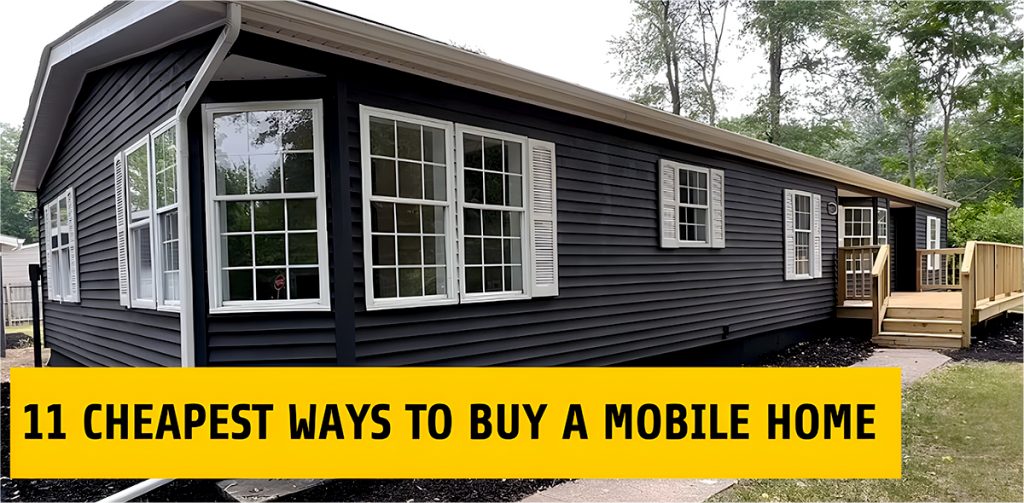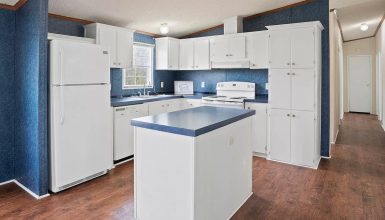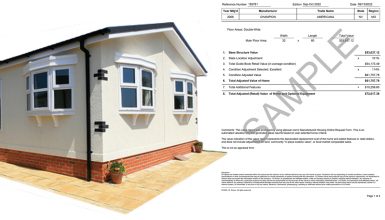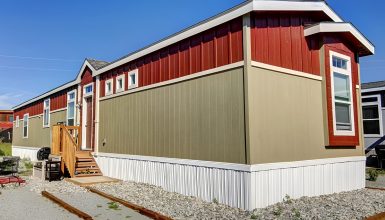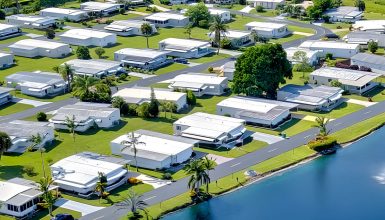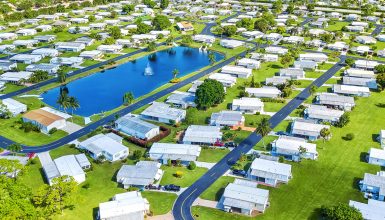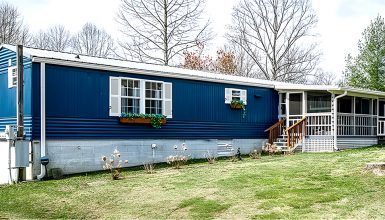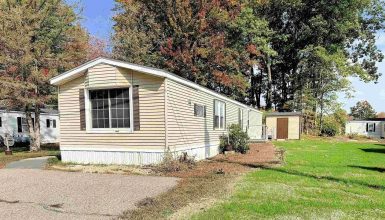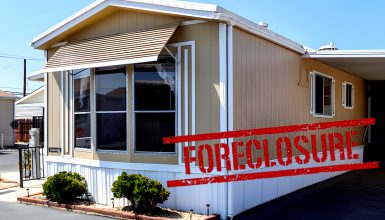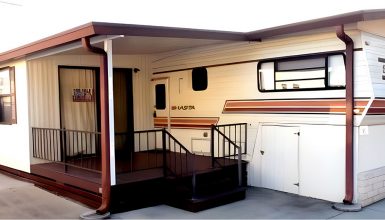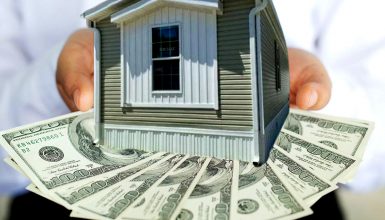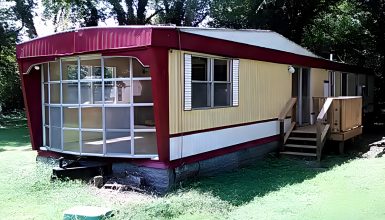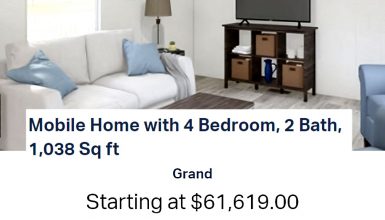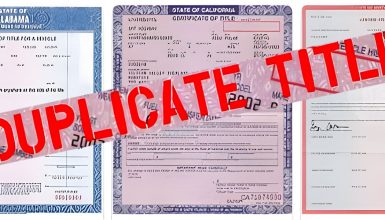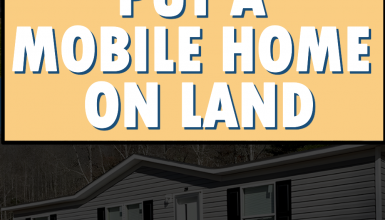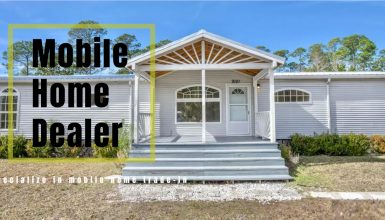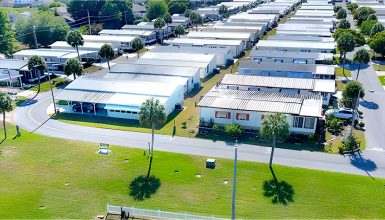Mobile homes offer a wallet-friendly doorway to homeownership, a ticket to financial freedom without sacrificing comfort or style. You see, becoming a homeowner doesn’t have to break the bank. With the right know-how, you can snag a mobile home that suits your needs without emptying your pockets. This article is your compass, pointing you toward the most cost-effective ways to buy a mobile home. Let’s get started!
1. Buying a Used Mobile Home
You might be wondering, why buy used? Well, think of it like this: when you buy a brand-new car and drive it off the lot, it depreciates in value instantly. Mobile homes work similarly. Their price drops once they’re not “new” anymore, even if they’re still in great shape.
But here’s the secret sauce: a well-maintained, used mobile home can give you the same comfort and functionality as a new one but at a fraction of the price. Now that’s what we call a sweet deal!
Finding a used mobile home is like going on a treasure hunt. There are gems in the form of lovingly cared-for homes, just waiting for you to discover them. You can start your search on online platforms, at local dealerships, or even by word of mouth.
However, remember that buying used doesn’t mean compromising quality. Make sure you thoroughly check the home’s condition. Check for signs of water damage, structural issues, or faulty wiring. Hiring a professional inspector might cost a bit upfront. Still, it could save you from hidden, costly repairs.
2. Purchasing from Private Sellers
One great place to score an excellent deal is from a private seller. It’s like a yard sale – bypassing the store and heading straight to the source. This often means lower prices and more room for negotiation. Yes, you read that right! You might get to flex your bargaining muscles here.
Private sellers are people just like you and me. They could be selling their mobile home for various reasons: maybe they’re moving, upgrading, or need to sell fast. In such cases, they might be willing to lower the price for a quicker sale. Sounds promising, doesn’t it?
But remember, buying from a private seller also requires a keen eye. Unlike buying from a dealership, there’s no warranty or return policy here. You’re on your own. Before shaking hands on a deal, check the mobile home thoroughly, ideally with a professional inspector.
Don’t forget to ask questions, too. How old is the home? Why are they selling? Have there been any major repairs or issues? Picture yourself as a detective, gathering clues to ensure this purchase has no unpleasant surprises.
One last tip: stay patient. The perfect deal from a private seller might take some time. But when it does, you’ll be ready to grab it! And remember, the sweetest victories often come from the most unexpected places.
3. Considering Foreclosures
So, we’ve talked about used mobile homes and private sellers, but another option might land you a sweet deal. Have you considered buying a foreclosed mobile home? It’s a bit like finding designer clothes at a thrift store—sometimes, you hit the jackpot and score a great home at a fraction of the price. But let’s unravel this, shall we?
Foreclosure happens when a homeowner can’t keep up with their mortgage payments. The lender then steps in, repossesses the home, and sells it to recover the money they’re owed. Not the happiest scenario for the original owner, but it could be a golden opportunity for a savvy buyer like you.
Foreclosed homes often come with enticing price tags. But remember, they’re sold ‘as-is.’ It’s crucial you know what you’re getting into. Some might need some sprucing up, while others require significant overhauls. You’ll need to factor in these potential costs when calculating your budget.
So where can you find these foreclosed mobile homes? Banks, credit unions, and government agencies like the Department of Housing and Urban Development often list them. There are even websites that specialize in foreclosure listings. Keep an eye on these platforms; you could snag a home for a steal!
But remember, buying a foreclosure isn’t for the faint-hearted. It often involves a lot of paperwork and waiting. It’s like waiting in line for a hot new roller coaster—you’ve got to have patience and a strong will. But if you’re up for the ride, a foreclosed home could be your ticket to affordable homeownership. Buckle up and enjoy the journey!
4. Choosing a Smaller Mobile Home
Let’s talk about sizing down. No, not your clothes or your coffee order, but your mobile home. Now, before you brush off the idea, hear me out. There’s a certain charm to compact living that’s been catching on. And, with a smaller mobile home, your wallet might also breathe a sigh of relief.
Mobile homes come in different sizes—single-wide, double-wide, and even triple-wide. The larger the home, the steeper the price. So, if you’re looking for a cost-effective option, a smaller, single-wide home could be your golden ticket.
A smaller mobile home means less square footage, but that doesn’t mean it can’t pack a punch. With a clever layout and smart storage solutions, a compact home can be just as functional, comfortable, and stylish as a larger one. Think space-saving furniture, vertical storage, and multi-purpose rooms. Your smaller home can be a masterclass in efficiency.
Besides, smaller homes come with other perks too. They’re often cheaper to maintain, heat, cool, and clean. That means more time to enjoy your home and less time spent on chores. Not a bad trade-off, right?
Choosing a smaller home isn’t just about cost savings. It’s also about embracing a lifestyle with less clutter, less cleaning, and more coziness. It’s about making every square foot count. So, if you’re up for minimalistic living, a smaller mobile home might be your cup of tea. Here’s to living large in a small space!
5. Buying on Leased Land
Let’s put on a different hat and dive into another strategy: buying a mobile home on leased land. Picture it as buying a car but parking it in a rented garage. You own the mobile home (the car) but not the land it sits on (the garage). It might seem unconventional, but it offers a cost-effective path to homeownership. Let’s dive deeper.
When you buy a mobile home on leased land, you typically pay a monthly lot rent. This is a lot like paying rent for an apartment, but here’s the kicker: you own the home itself. That means you can renovate, redecorate, and make your mobile home truly yours while enjoying the lower upfront costs.
You can find leased land in mobile home parks, co-op communities, or private property. The amenities and vibe can vary widely. Some parks offer a tight-knit community feel and have shared amenities like a pool or community center. Others might offer a more private and quiet setting. It’s all about finding what suits you best.
But hold on! Before you jump in, let’s talk about the fine print. Leased land agreements can have rules and restrictions, like age, pet, and guest policies. Ensure you’re comfortable with these rules before signing on the dotted line.
There’s one more thing. While the price tag of a mobile home on leased land can be tempting, remember to factor the ongoing lot rent into your budget. It’s like a subscription service: the monthly charges add up.
Buying on leased land is like opting for a monthly gym membership over buying home workout equipment. It’s not for everyone, but it can be a smart and cost-effective choice for some. Weigh the pros and cons, and decide what’s best for your lifestyle and budget. It’s all about finding your perfect fit!
6. Doing Repairs Yourself
Next up on our list is tackling home repairs yourself. Buying a mobile home that needs a little love can offer substantial savings if you invest time and elbow grease. It’s a bit like finding a vintage dress at a thrift store— with a slight alteration. It can turn into a stunning piece.
Think about it. When a mobile home requires some repairs, the price often drops. But here’s the good news: not all repairs are monstrous tasks. Many are manageable DIY projects that can even be quite rewarding. You might be surprised at what a fresh coat of paint, new fixtures, or updated flooring can do to transform a space. Plus, there’s something immensely satisfying about standing back and admiring your handiwork, right?
Remember though, not all projects are DIY-friendly. Complex issues like plumbing, electrical work, or structural repairs often require professional expertise. Knowing when to roll up your sleeves and when to call in the pros is crucial. Safety first, always!
Before you commit to a fixer-upper, have the home thoroughly inspected. This helps you understand the scope of repairs and their potential cost. There’s a fine line between a good deal and a money pit, and a detailed inspection helps you distinguish between the two.
7. Considering Older Models
Ready for another budget-friendly tip? How about we journey back in time and consider older mobile homes? It’s like vintage shopping—you never know what treasures you might uncover!
Like cars and gadgets, newer mobile homes usually have a higher price tag. But older models? They often have a much friendlier price. Sure, they might not have all the latest bells and whistles, but they can offer solid value for money.
Think of it this way: an older mobile home is a blank canvas. With some creativity and TLC, it can be transformed into a charming, personalized space. Imagine a dash of retro flair that meets modern comfort. Now that sounds appealing, doesn’t it?
But before you get swept up in the charm of an older home, here’s a word of caution. Like any old property, these homes can sometimes hide costly issues. These hidden hitches can rack up repair bills from outdated wiring to inefficient insulation. A professional inspection is crucial before buying an older mobile home. Remember, we want vintage charm, not vintage problems!
Patience and thoroughness are the keys to finding a gem among older mobile homes. Take your time to inspect the home, understand its history, and assess any necessary repairs. It might take some work, but finding that perfect blend of retro charm and modern livability could be just the cost-effective solution you’re looking for.
8. Buying Direct from Manufacturers
Have you ever tried buying directly from the source? Like picking apples straight from the orchard or getting coffee beans from a local roaster? That’s what buying a mobile home directly from the manufacturer feels like. It’s a direct line from the maker to you, skipping the middleman, which can mean cost savings. Let’s explore this option.
Manufacturers are the folks who design and build these mobile homes. You cut out the dealership’s markup when you buy directly from them. This means you could get a new mobile home for a lower price, similar to a clearance sale at your favorite store.
Direct buying also gives you the unique opportunity to customize your home. Want a particular layout? Need specific features? No problem! Many manufacturers offer customizable floor plans and features. It’s like building your own dream home but on a budget.
However, it’s not all rainbows and sunshine. Buying direct might mean you’re responsible for arranging transportation to your plot. And, of course, you’ll have to find a plot if you don’t already have one. This could be an added hassle and expense, so factor this into your decision.
Also, remember that not all manufacturers sell directly to the public. Some work exclusively with dealerships. So, if you’re considering this route, start by researching manufacturers who offer direct sales.
9. Negotiating the Price
Next up, let’s talk about negotiating. A word that often sends a shiver down the spine, but trust me, it’s not as scary as it sounds. And when it comes to mobile homes, a little haggling could save you a tidy sum. It’s a bit like scoring a last-minute discount on a holiday booking—totally worth the effort!
Let’s start with a crucial point: the listed price is often just a starting point. Whether you’re buying from a dealership, a private seller, or even directly from a manufacturer, there’s usually room for negotiation. The key is doing your homework. Research comparable homes, know your budget, and clearly understand the home’s condition. Knowledge is power in the negotiation game!
When you’re ready to make an offer, don’t be afraid to start low. It’s like starting a game of tug-of-war—you want some room to pull back and forth. Remember to be respectful and realistic with your offer. After all, negotiation is a two-way street.
But negotiation isn’t just about the price. You could also negotiate for repairs to be completed before purchase, for appliances to be included, or even for the seller to pay some of the closing costs. Think outside the box, and you might find multiple ways to save.
Of course, negotiation requires a bit of courage and a lot of communication. But remember, the worst they can say is no. And even then, you’re no worse off than when you started. So, muster up your confidence, and get ready to haggle. A successful negotiation could be your key to scoring the best deal on a mobile home.
10. Evaluating Location
Let’s embark on the real estate mantra: location, location, location! Yes, even in mobile homes, location plays a vital role. It’s like picking the perfect picnic spot—you want the best view, convenient access, and a comfortable environment. Let’s see how location can influence the price of a mobile home.
The value of a mobile home is often closely tied to its location. A mobile home in a popular area or a well-managed mobile home park can demand a higher price tag. Conversely, homes in less desirable areas or poorly maintained parks can be more budget-friendly.
Consider proximity to amenities like shopping, healthcare, and schools. A location near these conveniences can make life a lot easier. But remember, desirable features often come with a higher cost. It’s a bit like choosing a seat at a concert—the better the view, the higher the price.
If you’re buying on leased land, evaluate the park’s management and community. Is the park well maintained? What amenities does it offer? Are there any rules or regulations that might affect your lifestyle? These factors can significantly influence your living experience and the home’s cost.
Don’t forget to consider potential future developments. Is the area growing? Could there be noise or construction issues down the line? It’s like looking at the forecast before planning a beach day—you want to know what’s coming.
Remember, while the mobile home might be mobile, its location isn’t. Choose wisely; a good location could provide a great living environment without breaking the bank.
11. Financing a Mobile Home
The finale on our list is all about money. But not just spending it—financing it. Think of it as a puzzle where the pieces are dollars and cents and the picture to be completed in your new mobile home.
When financing a mobile home, you have a few different routes. Traditional mortgages, personal loans, and mobile home loans are all possibilities. Each comes with its rules and rates, like different toll roads on a highway. So, figuring out which one best fits your financial situation is crucial.
Traditional mortgages can be a bit tricky for mobile homes. They’re often reserved for homes permanently attached to the land they sit on. If that’s not your scenario, you may need to consider other options. It’s a bit like trying to fit a square peg in a round hole—it might not work.
That’s where mobile home loans, like Chattel loans, come in. They’re designed specifically for mobile or manufactured homes, making them a more flexible option. They’re like the adjustable wrench in your financial toolkit, designed to fit your unique needs.
Then there are personal loans, which can be used for just about anything, including purchasing a mobile home. They’re a bit like a wildcard, flexible and versatile. But remember, they often come with higher interest rates than mortgages or mobile home loans.
Whichever route you choose, remember: always shop around for the best rates. Think of it as browsing through different stores for the best bargain. And don’t forget to factor in all the costs—down payment, interest, monthly payments—into your overall budget.
Conclusion
There are countless ways to make your dream of owning a mobile home more affordable. It’s all about being patient, researching, and being ready to seize opportunities when they come.

